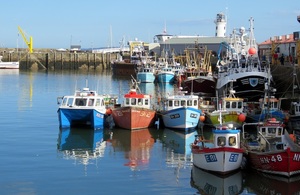Flagship Fisheries Bill becomes law
The Fisheries Bill receives Royal Assent after 10 months in Parliament

The new Act allows the UK to take back control of its waters out to 200 nautical miles, as an independent Coastal State.
Yesterday the UK’s first major domestic fisheries legislation in nearly 40 years passed into law. The Fisheries Act 2020 gives the UK full control of its fishing waters for the first time since 1973.
The Fisheries Act will enable the UK to control who fishes in our waters through a new foreign vessel licencing regime and ends the current automatic rights for EU vessels to fish in UK waters.
Underpinning everything in the Act is a commitment to sustainability, ensuring healthy seas for future generations of fishermen. The UK Government and Devolved Administrations will now develop new fisheries management plans for managing fisheries to benefit the fishing industry and the marine environment.
Healthy fish stocks, with the prospect of further fishing opportunities delivered through international negotiations, will help drive economic growth for coastal communities around the country by making sure the industry can continue to thrive for years to come.
The Act now places the UK on a firm legal footing as the Transition Period ends, with the ability to put in place and enforce new rules to protect our offshore marine protected areas - boosting the government’s Blue Belt of marine protection around England’s coast.
Environment Secretary George Eustice said:
This is a huge moment for the UK fishing industry. This is the first domestic fisheries legislation in nearly 40 years, and we will now take back control of our waters out to 200 nautical miles or the median line.
The Fisheries Act makes clear our intention to continue to operate on the world stage as a leading, responsible, independent coastal State. We will protect our precious marine environment, whilst ensuring a fairer share of fishing opportunities for UK fishermen.
By swiftly responding to the latest scientific advice and needs of our fishing industries we will secure a thriving future for our coastal communities.
Fisheries Minister Victoria Prentis said:
The Fisheries Act marks another crucial milestone as we embark on a new journey as an independent coastal State.
This means that we can tailor our policies to the needs of the UK industry - making the most of the riches of our waters, in harmony with the needs of the marine environment.
Barrie Deas, Chief Executive, National Federation of Fishermen’s Organisations, said:
The passage of the Fisheries Act 2020 into law is a landmark event. The new legislation has successfully avoided the pitfalls of the Common Fisheries Policy.
It provides a balanced framework for a much more agile, flexible system of sustainable fisheries management in the future, consistent with the UK’s new status as an independent coastal State.
Elspeth Macdonald, Chief Executive of the Scottish Fishermen’s Federation said:
The Fisheries Bill becoming law is another important milestone in the UK becoming an independent coastal State at the end of this year.
The Fisheries Act will provide the right legal framework for responsible fisheries management in the UK, and SFF looks forward to working with both the UK and Scottish governments in taking forward the innovative approaches, such as fisheries management plans, that the Act makes provision for.
The Fisheries Act allows the Government to fund a wider range of fisheries projects, for instance to encourage the uptake of new technologies at sea, improve port infrastructure, and support recreational sea angling.
It also equips the Devolved Administrations with greater fisheries management powers. This means each Administration will tailor their approach based on the specific needs of their industries and waters, enabling a move away from the inflexible and cumbersome Common Fisheries Policy.
The Act also recognises that many fisheries resources are ‘shared stocks’ as they swim across borders. For these stocks, negotiation with other countries is crucial, as sustainable catches cannot be achieved through UK action alone.
The Act also goes further than the Common Fisheries Policy by ensuring further action will be taken to minimise the fishing sector’s impact on climate change, for example by developing policies to reduce emissions for instance from fishing vessels or encourage decarbonisation.
Alongside the Act, the UK has now secured new bilateral fisheries arrangements, including the agreements with Norway and the Faroe Islands, and the Memoranda of Understanding with Greenland and Iceland. Through such arrangements the UK will be able to negotiate future sustainable fishing opportunities with other coastal states, in the best interests of our fishing industry and marine environment, now and in the future.
Further information
The Fisheries Act will ensure:
- The UK government and the Devolved Administrations will publish a legally binding Joint Fisheries Statement and develop to coordinate fisheries management plans and achieve sustainability goals
- EU vessels’ automatic access right to fish in UK waters is removed
- Foreign boats will be required a licence to fish in UK waters and will have to follow the UK’s rules
- Fisheries are managed in a sustainable way - balancing social, economic, and social benefits while preventing the over exploitation of fish stocks
- The UK fisheries administrations will seek to ensure increased benefits from fish caught by UK boats
- Sensitive marine species, such as dolphins, are protected and the bycatch of unwanted fish reduced
- UK boats can continue to access any part of UK waters, as they do now regardless, whether they are registered in England, Scotland, Wales or Northern Ireland
- UK administrations can set up new domestic grant schemes, providing funding in new areas and tailored to the needs of their sectors.